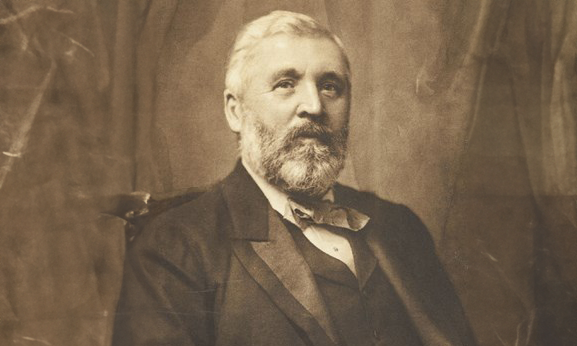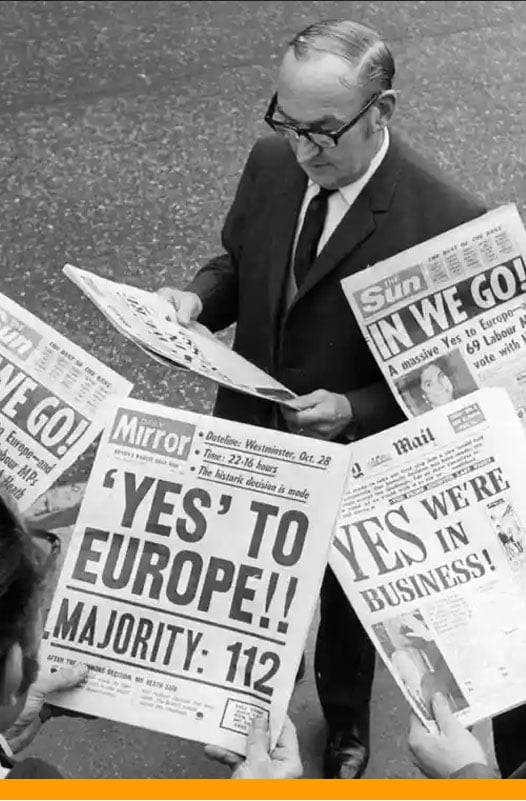Key points
Identifying stocks set to benefit from the digital revolution and the advantages of maintaining a wide-ranging portfolio are among topics addressed by The Monks Investment Trust’s manager Spencer Adair.

The value of your investment and any income from it can do down as well as up and your capital is at risk.
Technology has reshaped consumers’ lives. From ordering taxis and takeaways through to shopping and socialising, a wave of digital transformation has altered habits and led to the rise of some of the world’s most valuable companies.
Commerce, entertainment and advertising are among the industries that have already experienced huge change.
And Spencer Adair, manager of The Monks Investment Trust, believes there is much more to come.
“Technological progress and revolution are entering into previously virgin territories where there were lots of inefficient paper-based processes.” he says.
“That spread of technology is going to go much broader than it is today; we’re now beginning to tackle the really hard but important problems.”
He points to education, healthcare and business software as sectors primed for major disruption. And the trust has already invested in companies it believes will benefit from the transition. They include:
- Chegg, which rents print and digital textbooks to students. The firm has also expanded into providing online tools to help users study and write with greater fluency, as well as acquiring Thinkful, which offers careers advice and an internship posts search facility
- Moderna, the mRNA vaccine pioneer whose Spikevax jabs are playing a critical role in tackling Covid. The firm is also working on vaccines for other ailments, including the Epstein-Barr herpesvirus, as well as new ways to tackle cancer
- Twilio, which provides programmable building blocks to help its clients create their own customer engagement tools. These make it easy to add voice, messaging, video, email and social capabilities to proprietary apps. The company also offers software to help marketers run data-driven campaigns following its takeover of Segment
“I’m also excited about what could happen in insurance and banking,” Adair adds.
“Lemonade is using artificial intelligence to do much better underwriting in certain niches of insurance.”
Diversified and long term
This all suits Monks’ style of taking a highly-diversified approach, both in terms of the kinds of companies it invests in and where they operate.
“We have holdings across 120 businesses from every corner of the globe,” Adair explains.
“We can invest in anything, from an unlisted early-stage business to a relatively small company, all the way up to the giants of today.”
He adds that the trust’s interests range beyond tech-focused companies to those considered tech-enabled. Recent additions include the oat milk producer Oatly and the implantable contact lens maker STAAR Surgical, which are both involved in ‘new growth’ areas and have, potentially, decades of growth ahead of them.
The trust’s scope is further extended by its biggest holding – a stake in Baillie Gifford’s Schiehallion Fund. It focuses on fast-growing private companies that could become publicly traded soon, including TikTok owner ByteDance, the payments processor Stripe and the rockets and satellite internet company SpaceX.
Monks further distinguishes itself from its peers by the length of time it holds on to stocks after taking a stake.
Adair notes that despite all the turmoil caused by the Covid pandemic, there had only been a 16 per cent turnover of its portfolio in the year running to September 2021.
“That implies that even with all the news, we’re still taking greater than a five-year time horizon,” he says.
He adds that his team is, however, rigorous in keeping a check on Monks’ investments: each stock is regularly tested to ensure there’s at least a 30 per cent probability it will double in value within five years.
“It stops us getting carried away and falling in love with any single holding,” Adair explains.
To further scrutinise its decision making, the trust recently employed a team of psychologists.
They are examining a selection of its most difficult historical decisions and interviewing members of both the investment and clients team involved.
The experiment aims to uncover ways to enhance performance, and it’s expected the study will highlight the importance of cognitive diversity.

Global scouts
Monks also draws on Baillie Gifford’s wider resources to help identify growth companies of tomorrow.
It does this by calling on a network of ‘scouts’ – senior representatives from across a range of investment teams who share their ideas and insights with the trust.
The group was recently expanded to include two overseas-based investment managers: Rio Tu in Shanghai and Dave Bujnowski in New York.
Read more about Bujnowski and Tu’s scouting activities in their Trip Notes article for Trust Magazine
Trust 43 — No Trip-Notes Connecticut and Shanghai (magazinebailliegifford.com)
Adair says having people on the ground who can meet the founders and management teams of potentially disruptive young businesses gives the trust a competitive advantage in understanding their ambitions and motivations.
He adds that it also helps his team compare businesses from around the world.
For instance, before buying a stake in Chinese electric car maker Li Auto in March, the trust judged it against Germany’s BMW, the US’s Tesla, India’s Tata and Japan’s Toyota.
“Part of the process is that we ask each scout to name the five stocks they would buy tomorrow and the five stocks they would sell,” Adair adds. “We really value hearing dissenting views, especially what we might be missing.”
“That forces them to highlight our blind spots – it's a really fabulous risk control.”
Sustainable investments
There’s one deliberate gap among Monks’ interests. Following the sale of a stake in American energy company EOG Resources in June, the trust no longer has a traditional energy company in its portfolio.
“We’re oil- and gas-free, for probably the first time in 90 years, which is pretty exciting as an indicator of how we see the world developing” says Adair.
Instead, he is focused on firms that provide the building blocks to spur the shift to solar, wind power, battery storage and other means of delivering low or net-zero energy. Relevant holdings include the lithium miner Albemarle, as well as the miners BHP and Rio Tinto, which supply the required copper and aluminium. A shift from hydrocarbons is only one of many ways that sustainability has become woven into Monk’s decision-making processes.
Adair says the trust quizzes all potential holdings about their environmental, social and governance (ESG) responsibilities by asking simple but tough questions such as ‘what is your core purpose’, rather than rely on less insightful metrics.
“The need to balance profit and purpose has never been more important,” he says.
“That’s been driven by demographic shifts – younger consumers – but also by technology, because if you make a mistake today as a brand then it’s everywhere, so you have to really live up to your principles.”
He adds that the trust no longer outsources any of its ESG analysis and can now draw on a team of more than two dozen in-house specialists who are shared across Baillie Gifford.
Investment opportunities and the methods to identify them inevitably change with time. And future events may unexpectedly act as a setback for some holdings while benefiting others, just as the Covid pandemic has done.
But Adair suggests that Monks’ continued hunger for long-term growth, its broad remit in looking for companies that can provide it, and a healthy sense of paranoia that guards it against becoming complacent in regards to its decision-making processes should keep Monks on course for years to come.
Risk Factors and Important Information
The views expressed in this article are those of the Monks managers and should not be considered as advice or a recommendation to buy, sell or hold a particular investment. They reflect personal opinion and should not be taken as statements of fact nor should any reliance be placed on them when making investment decisions.
Baillie Gifford & Co and Baillie Gifford & Co Limited are authorised and regulated by the Financial Conduct Authority (FCA). The investment trusts managed by Baillie Gifford & Co Limited are listed UK companies. Baillie Gifford & Co Limited is the authorised Alternative Investment Fund Manager and Company Secretary of the Trust. The Monks Investment Trust PLC (Monks) is listed on the London Stock Exchange and is not authorised or regulated by the FCA. The value of its shares, and any income from them, can fall as well as rise and investors may not get back the amount invested.
Any stock examples and images used in this article are not intended to represent recommendations to buy or sell, neither is it implied that they will prove profitable in the future. It is not known whether they will feature in any future portfolio produced by us. Any individual examples will represent only a small part of the overall portfolio and are inserted purely to help illustrate our investment style.
Please remember that changing stock market conditions and currency exchange rates will affect the value of your investment in the fund and any income from it. You may not get back the amount invested.
Monks invests in overseas securities. Changes in the rates of exchange may also cause the value of your investment (and any income it may pay) to go down or up.
The trust’s risk could be increased by its investment in private companies. These assets may be more difficult to sell, so changes in their prices may be greater.
The trust invests in emerging markets where difficulties in dealing, settlement and custody could arise, resulting in a negative impact on the value of your investment.
The trust can borrow money to make further investments (sometimes known as ‘gearing’ or ‘leverage’). The risk is that when this money is repaid by the trust, the value of the investments may not be enough to cover the borrowing and interest costs, and the trust will make a loss. If the trust’s investments fall in value, any invested borrowings will increase the amount of this loss.
Market values for securities which have become difficult to trade may not be readily available and there can be no assurance that any value assigned to such securities will accurately reflect the price the trust might receive upon their sale. The trust can make use of derivatives which may impact on its performance.
This document contains information on investments which does not constitute independent research. Accordingly, it is not subject to the protections afforded to independent research and Baillie Gifford and its staff may have dealt in the investments concerned.
A Key Information Document is available by visiting www.bailliegifford.com.
14124 10005978




